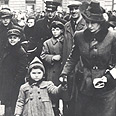
Warsaw Ghetto (archives)
באדיבות אורן יהודה
Barbecuing at Holocaust museum
Ghetto Fighters' Museum in Western Galilee turns its cafeteria into banquet hall. Executive director: People ate, drank and danced at ghetto as well
It appears people are willing to do anything to ease the effects of the global financial crisis: The Ghetto Fighters' Museum in the Western Galilee, which has suffered economic difficulties and an NIS 2-million (about $506,530) deficit, has rented out its small cafeteria to the members of Kibbutz Lohamei Hagetaot, who have turned it into a small restaurant and banquet hall.
Until now, the cafeteria located at the entrance to the museum served the museum's visitors.
The person running the new restaurant is Ilan Shmulovich, a professional chef who has been a member of Kibbutz Lohamei Hagetaot for 42 years. He rented the place, renovated it and adjusted it to banquets of up to 70 people.
"Several days ago, we celebrated the 80th birthday party of one of the kibbutz members at the cafeteria. Why not? What's wrong with that?" Shmulovich said on Wednesday.
"The renewed place is called 'La Paz', peace in Spanish. I brought in new furniture, a kitchen and a roof. In the latest event we grilled meat and had a barbecue. The museum is not a cemetery," he added.
'Valued assets being sold'
One of the museum's senior workers expressed his resentment over the decision to open the restaurant."This sounds and looks really bad. It's all for the sake of money. There's a difference between a modest cafeteria for visitors and a restaurant. This is not what the museum's founders dreamed of, especially not barbecue celebrations.
"It's true that there were 56 cafés in the Warsaw Ghetto, but they are the ones we are pointing a finger at, as the café owners' brothers starved or died in the ghetto. I view the leasing of the place the fact that it was turned into a restaurant for banquets as the sale of valued assets," the worker said.
Simcha Stein, executive director of the Ghetto Fighters' Museum, does not see anything wrong with the latest innovation.
"Tell me, didn’t people eat at the ghetto? Didn't they drink? Didn't they dance? The museum is fighting for its existence and renting out the place is another source of income. We also want to lease the amphitheater which stands desolate all year long, but so far we haven't had any potential renters."










